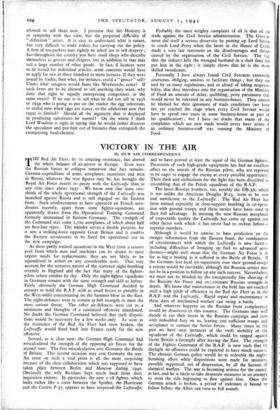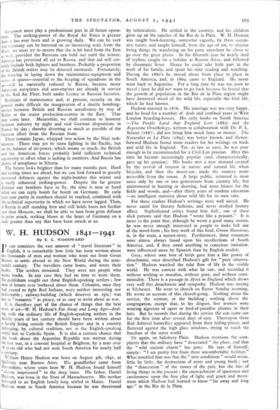VICTORY IN THE AIR By OUR AIR CORRESPONDENT T HE Red
Air Fleet, by its amazing resistance, has altered the whole balance of air-power in Europe. Even were the Russian forces to collapse tomorrow that fact remains. German expenditure of arms, aeroplanes, munitions and men in Russia, whatever the true figures may be, has brought the Royal Air Force nearer to parity with the Luftwaffe than at any time since about 1935. We know now that some two- thirds of the whole operational strength of the Luftwaffe was launched against Russia and is still engaged on the Eastern front. Such reinforcements as have appeared on French aero- dromes recently, apart from some fighter-squadrons, are apparently drawn from the Operational Training Command formerly maintained in Eastern Germany. The strength of the Command was some r,7oo aeroplanes, of which about half are first-line types. The transfer serves a double purpose, for it sets a striking-force opposite Great Britain and it enables the Eastern aerodromes to be freed for operational use in the new campaign.
As these partly trained squadrons in the West form a reserve pool from which men and machines can be drawn to meet urgent needs for replacements, they are not likely to be squandered in action on any considerable scale. That may account for the tentative nature of the scattered night-bombing recently in England and the fact that many of the fighter- pilots refuse combat by day. Only the night-fighter squadrons in Germany remain with the same strength and skill as before. Fairly obviously the German High Command decided to attempt to hold the R.A.F. with as small forces as possible in the West while concentrating on .the hammer-blow in the East. The night-defences were to remain at full strength to meet the most serious threat. The other air-defences were cut to a minimum and thoughts. of a continued offensive abandoned. No doubt the German Command believed that such disposi- tions would be necessary for a few weeks only. As soon as the resistance of the Red Air Fleet had been broken, the Luftwaffe would flood back into France ready for the new offensive.
Instead, as is clear now, the German High Command had miscalculated the strength of the opposing air forces for the second time. The first miscalculation cost Germany the Battle of Britain. This second occasion may cost Germany the war. An error on such a vital point is all the more surprising because of the close collaboration which was supposed to have taken place between Berlin and Moscow during 1940. Obviously the wily Russians kept much back from their inquisitive visitors. In particular, the new 1-18 fighter, which looks rather like a cross between the Spitfire, the Hurricane and the Curtiss P-37, appears to have surprised the Luftwaffe, and to have proved at least the equal of the German fighters. Possession of such high-grade equipment has had an excellent effect on the morale of the Russian pilots, who are reported to be eager to engage the enemy at every possible opportunity. Their dash and enthusiasm for the fight has been described as resembling that of the Polish squadrons of the R.A.F.
The latest Russian bombers, too, notably the DB-3A, which is not unlike the American Douglas B-23, seem to be new and unwelcome to the Luftwaffe. The Red Air Fleet has been trained especially in close-support bombing in co-opera- tion with ground troops, and these tactics have been used to their full advantage. In meeting the new Russian aeroplanes of respectable quality the Luftwaffe has come up against one other factor with which it has never had to reckon before— superior numbers.
Although it would be unwise to base prediction on the meagre information from the Eastern front, the combination of circumstances with which the Luftwaffe is now faced— including difficulties of bringing up fuel to advanced aero- dromes—might well mean that the German Air Force is in for as big a beating as it suffered in the Battle of Britain. If the Germans lost local air-superiority over their ground-troops a retreat would be inevitable, although the Russian armies may not be in a position to follow up any such success. Nevertheless, we must not be blinded by the unexpectedly fine showing of the Russian Air Force and overestimate Russian strength in depth. We know that maintenance in the field has not reached such a high pitch of efficiency in the Red Air Fleet as in the R.A.F. and the Luftwaffe. Rapid repair and maintenance in these days of mechanised warfare can swing a battle.
And whatever happens on the Russian front complacency would be disastrous in this country. The Germans may well decide to cut their losses in the Russian campaign and turn with redoubled fury on us, leaving just sufficient troops and aeroplanes to contain the Soviet forces. Many times in the past we have seen instances of the swift mobility of the squadrons of the Luftwaffe, which could be ranged against Great Britain a fortnight after leaving the East. The strength of the Fighter Command of the R.A.F. is now such that no daylight air-offensive could be expected to have much success. The obvious German policy would be to redouble the night- bombing effort while dispositions were made for invasion, possibly supported, out of desperation, by all the horrors of chemical warfare. The war is becoming serious for the enemy at last, and he is likely to take desperate measures in an attempt to stem the tide beginning to flow against him. Once the German attack is broken, a period of stalemate is bound to follow before the Allies can turn to full assault. Air-power must play a predominant part in all future opera- tions. The striking-power of the Royal Air Force is greater than it has ever been and is growing daily. We can be sure that Germany can be battered on an increasing scale from the West: we must try to ensure that she is hit hard from the East as well, provided the Russians can hold out until the winter. America has promised all aid to Russia, and that aid will cer- tainly include both fighters and bombers. Probably a proportion of the British orders may be diverted eastwards. Fortunately, the time-lag in laying down the maintenance-equipment and stores of spares—essential to the keeping of squadrons in the air—will be materially reduced in Russia, because many American aeroplanes and aero-engines are already in service in the Red Air Fleet, built under licence in Russian factories.
Problems of maintenance and, at present, security on the ground make difficult the inauguration of a shuttle bombing- service between British and Russian aerodromes by way of Berlin or the major production-centres in the East. That may come later. Meanwhile, we shall continue to hammer German industry by night and raid German dispositions in France by day ; thereby diverting as much as possible of the German effort from the Russian front.
There remains Japan, whipped into action by the Nazi task- masters. There may yet be stern fighting in the Pacific, but on the balance of air-power, which means so much, the British and the American forces probably hold sufficient technical superiority to offset what is lacking in numbers. And Russia has plenty of aeroplanes in Siberia.
The future looks brighter than for many months past. Hard and testing times are ahead, but we can look forward to greatly increased defences against the night-bomber this winter and a vastly enhanced striking-power. Despite the far greater distance our bombers have to fly, the time is near at hand when we can reply bomb for bomb on Germany. By early next year parity in numbers should be reached, combined with the technical superiority in which we have never lagged. Then, if Russia is still standing firm and still holds bases not further east than Moscow, we shall be able to turn from grim defence to grim attack, striking blows at the heart of Germany on a scale greater than any that have been struck at us.



























 Previous page
Previous page